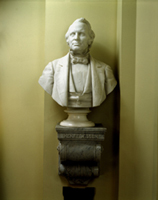This being the day it is, I started to think about Shakespeare’s “Julius Caesar” and the line, “I come to bury Caesar, not to praise him.” I looked it up to make sure I had it right (I didn’t). I read the scene, which I saw performed once, about 10 years ago, during the late, lamented Berkeley Shakespeare Festival. Unfamiliar with it then, I found it thrilling. And it still is: the purity of the calculation in Antony’s speech, the thoroughness of his triumph as a demagogue, his mastery over the mob.
“Julius Caesar,” Act III, Scene II:
Brutus:
“…Hear me for my cause; and be silent, that you may hear: believe me for mine honour, and have respect to mine honour, that you may believe: censure me in your wisdom, and awake your senses, that you may the better judge. If there be any in this assembly, any dear friend of Cæsar’s, to him I say, that Brutus’ love to Cæsar was no less than his. If then that friend demand why Brutus rose against Cæsar, this is my answer: Not that I loved Cæsar less, but that I loved Rome more. Had you rather Cæsar were living, and die all slaves, than that Cæsar were dead, to live all free men? As Cæsar loved me, I weep for him; as he was fortunate, I rejoice at it; as he was valiant, I honour him; but, as he was ambitious, I slew him. There is tears for his love; joy for his fortune; honour for his valour; and death for his ambition. Who is here so base that would be a bondman? If any, speak; for him have I offended. Who is here so rude that would not be a Roman? If any, speak; for him have I offended. Who is here so vile that will not love his country? If any, speak; for him have I offended. I pause for a reply. … ”
[Enter Antony and others, with Caesar’s body.]
“…Here comes his body, mourned by Mark Antony: who, though he had no hand in his death, shall receive the benefit of his dying, a place in the common wealth; as which of you shall not? With this I depart: that, as I slew my best lover for the good of Rome, I have the same dagger for myself, when it shall please my country to need my death.”
Antony:
“Friends, Romans, countrymen, lend me your ears;
I come to bury Cæsar, not to praise him.
The evil that men do lives after them,
The good is oft interred with their bones;
So let it be with Cæsar. The noble Brutus
Hath told you Cæsar was ambitious;
If it were so, it was a grievous fault,
And grievously hath Cæsar answer’d it.
Here, under leave of Brutus and the rest,—
For Brutus is an honourable man;
So are they all, all honourable men,—
Come I to speak in Cæsar’s funeral.
He was my friend, faithful and just to me:
But Brutus says he was ambitious;
And Brutus is an honourable man.
He hath brought many captives home to Rome,
Whose ransoms did the general coffers fill:
Did this in Cæsar seem ambitious?
When that the poor have cried, Cæsar hath wept;
Ambition should be made of sterner stuff:
Yet Brutus says he was ambitious;
And Brutus is an honourable man.
You all did see that on the Lupercal
I thrice presented him a kingly crown,
Which he did thrice refuse: was this ambition?
Yet Brutus says he was ambitious;
And, sure, he is an honourable man.
I speak not to disprove what Brutus spoke,
But here I am to speak what I do know.
You all did love him once, not without cause:
What cause withholds you then to mourn for him?
“… They that have done this deed are honourable:
What private griefs they have, alas! I know not,
That made them do it; they are wise and honourable,
And will, no doubt, with reasons answer you.
I come not, friends, to steal away your hearts:
I am no orator, as Brutus is;
But, as you know me all, a plain blunt man,
That love my friend; and that they know full well
That gave me public leave to speak of him.
For I have neither wit, nor words, nor worth,
Action, nor utterance, nor the power of speech,
To stir men’s blood: I only speak right on;
I tell you that which you yourselves do know,
Show you sweet Cæsar’s wounds, poor poor dumb mouths,
And bid them speak for me: but were I Brutus,
And Brutus Antony, there were an Antony
Would ruffle up your spirits, and put a tongue
In every wound of Cæsar, that should move
The stones of Rome to rise and mutiny.”
Technorati Tags: berkeley
Like this:
Like Loading...




